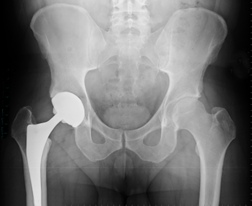 The good, the bad and the ugly
The good, the bad and the ugly
Hip implant surgery is a complicated process. Hips, like shoulders, are rotating 130-degree joints. The surgery involves cutting and replacing bone with sturdier polyethylene stuff, re-arranging muscles and ligaments, not to mention social support.
When everything goes well, recovery can still take several months. At its best, the surgery can restore a wide range of motion and activity. Folks can go out with friends – dancing, shopping, perhaps a boat – you name it. At its worst, the replacement is flawed, with more pain, less functionality and possibly more surgery.
Progressive modifications
In 2019, Synovo began a series of changes, arguably improvements, to its hip replacement technology. In general terms, these involved the way that the artificial implants are attached to existing bones. It all boils down to cement.
A cemented hip replacement uses a polymethylmethacrylate bone cement to fix the implant surface to the bone. The bone cement creates a grout and fixes the implant by acting as an interlocking surface between the implant and the bone rather than simply gluing the implant to the bone.
In 1991, the FDA approved what was then called the “Modified New Jersey Femoral Hip Replacement Component” conditioned on its “cemented use only.” It further stated that “[a]ny non-cemented fixation of this device is investigational” and must be regarded as a “significant risk device.” However, in 2019, Synovo began to market a cement-less fixation. It may be better; it may be worse, but it is clearly not what the FDA approved in 1991.
Beginning in 2022, the FDA became aware that Synovo had modified three components of its total hip system – the Femoral Resurfacing Cup, the Acetabular Fixation Cup and the Acetabular Bearing – in the years following the FDA’s initial approval of the device. Collectively, the changes were significant enough to void the FDA’s approval. The modified devices were simply no longer the same as those exhaustively tested, reviewed and approved as safe and effective for the treatment of severe pain and stiffness associated with osteoarthritis, rheumatoid arthritis, avascular necrosis, hip fracture or other forms of hip joint damage.
The FDA issued a warning letter to Synovo in March 2023 citing several violations, instructing the company to immediately stop manufacturing the modified devices and requiring that Synovo re-submit its Total Hip System for premarket approval. As of January 2024, Synovo had not submitted the extensive information required as part of the approval application. The FDA then followed up with the January 2024 advisory.
The affected Synovo hip brands include:
- the Synovo Total Hip Replacement System;
- the Synovo Preserve; and
- the Endotec BP.
How do I know if there’s a problem?
The FDA warned people who received hip replacements to watch out for signs of potential failure of Synovo hip replacement. These may include:
- pain;
- grinding or other noise;
- inability to bear weight;
- loosening; and
- weakness of the hip or knee on the side of your implant
The FDA suggests regular follow-up monitoring with your health care provider but advises against surgical removal and replacement unless necessary. Ultimately, the health and welfare of Synovo hip transplant recipients depends on what and when they report problems to their health care providers.
The big picture
READ MORE DEFECTIVE HIP IMPLANT LEGAL NEWS
As of April 2024, there were two different multidistrict litigations with a group of consolidated lawsuits addressing concerns over Stryker hip replacements. At their height, those two MDLs included as many as 3,637 cases, many of which have now settled. Also as of April 2024, a smaller number of hip implant lawsuits were still pending against Zimmer and Smith & Nephew. Synovo patients are clearly part of a much larger picture of hip implant failure and should seek legal assistance when medical issues arise.
